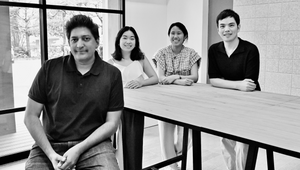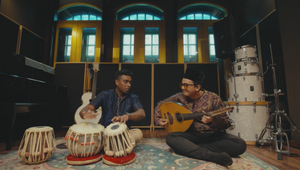
How Tribal and the National Heritage Board Are Reviving Singapore’s Tailoring Community

In a bid to reinvigorate Singapore's tailoring community, Tribal Worldwide Singapore and the National Heritage Board (NHB) introduced Recustom — a fashion movement fusing heritage and sustainability.
Recustom challenges traditional fashion by exclusively crafting garments from pre-loved clothes, collaborating with leading designers to produce exclusive looks, and involving local tailors in the creative process.
Speaking to LBB, Tribal creatives Junqi Liao and Shawn Lam, discusses how the project aims to revive old trades, promote sustainability, and celebrate Singapore's rich cultural heritage — all while engaging the youth through fashion-forward designs and upcycling practices.
LBB> What inspired the partnership between Tribal Worldwide Singapore and the National Heritage Board to launch Recustom, and how does this initiative align with the board's mission?
Junqi and Shawn> We wanted to ignite interest in Singapore’s rich cultural heritage among the youth and change the perception that heritage means ‘old-fashioned or boring’. To do this, we tapped into one of our youths’ biggest passion points—fashion—and created a platform for them to experience our heritage and contribute to presenting it in a new and fresh way.
LBB> Can you elaborate on the process of developing Recustom as a movement aimed at reviving Singapore's tailoring community and promoting sustainability in fashion?
Junqi and Shawn> We took inspiration from the world’s biggest labels to develop an exciting collection that would appeal to various audiences. To give Recustom street cred, we collaborated with Singapore’s leading designers known for multiple styles, including streetwear, minimalist unisex wear, contemporary women’s wear, resort wear, ethnic wear, and more. We worked with them to create unique design blueprints, and each of these designs used old clothes to create new fashion. We also approached local tailors to ensure the designs were easily understood and achievable. These were made available to all on our website.
LBB> How did you overcome the challenge of creating visibility and value for tailors among young trend-chasers, and what strategies did you employ to engage this demographic?
Junqi and Shawn> We had to ensure the design blueprints were cool and fresh – something the youth would naturally seek out and be excited about. To achieve this, we worked with leading fashion designers in Singapore, popular amongst the youth to create them. To build visibility for tailors, we also made a page on our site where people could easily find tailors to create Recustom outfits.
LBB> What was the rationale behind collaborating with Singapore's leading designers for the launch collection, and how did their involvement contribute to the credibility and success of Recustom?
Junqi and Shawn> Working with Singapore’s leading designers, we created excitement among their fanbase, which helped spread the word about Recustom. Because their designs were so appealing, more people became interested in developing their own Recustom editions of their favourite brands.
LBB> Could you share more about the design blueprints provided to customers and their role in creating one-of-a-kind Recustom pieces?
Junqi and Shawn> The design blueprints specifically considered the type of clothes available in everyday wardrobes and how they could be upcycled into new fashion. Each blueprint included the type and number of pre-loved clothes you would need. We worked with tailors and designers to ensure they were achievable and simple to create.
All you had to do was take the blueprint along with the old clothes required to a neighbourhood tailor to get it made. No two Recustom pieces are the same, as each is made of a combination of your unique pre-loved garments, and every creation involves a discussion between you and your tailor to produce a piece that fits you perfectly.
LBB> How does Recustom differentiate itself from traditional fashion brands and fast-fashion outlets, and what unique value proposition does it offer consumers?
Junqi and Shawn> Unlike traditional fashion, Recustom can never be bought in stores, it can only be made at your local tailor. It also promotes a sustainable culture in fashion, as it is made entirely of pre-loved clothes, with exclusive design blueprints created by leading names in fashion.
LBB> What impact do you hope Recustom will have on Singapore's tailoring community and the broader fashion industry in promoting heritage trades and sustainability practices?
Junqi and Shawn> Through Recustom, we hope to rejuvenate old trades, such as tailors and ethnic wear craftspeople, by making them exciting and relevant to the youth. This will ensure our nation’s rich culture is preserved and passed on long into the future.
Additionally, we hope to create a sustainable culture in fashion where people don’t throw out old clothes but instead ‘Recustom’ them to fashionable new pieces with the help of tailors. This creates a new purpose and income for our local tailors and heritage craftspeople.
LBB> Can you discuss the role of social media and the website in bringing Recustom to life and how these platforms contribute to the brand's visibility and engagement with its audience?
Junqi and Shawn> We launched the campaign on social media via the @recustom.sg Instagram page – leveraging the fashion design community, including designers, photographers, and talent, to get the word out. At the heart of our campaign is a website where people can browse the collection, look for tailors, and download our exclusive fashion design blueprints for free.
LBB> As Recustom expands, what opportunities do you see for further collaboration with designers, tailors, and students, and how do you plan to leverage these partnerships to drive growth?
Junqi and Shawn> Beyond this first set of looks, we have begun exploring ways to keep Recustom fresh and exciting for the youth moving forward, with new blueprint collections in the future. For a potential Season 2, we hope to crowdsource even more ideas from the fashion community. Besides getting new designers on board, we have also begun sounding out local design/fashion schools to contribute new blueprint designs to Recustom - designs the students and their peers will be excited about.















